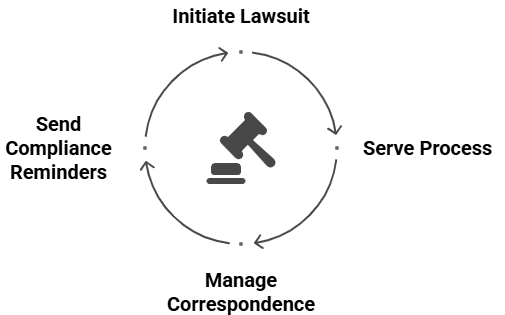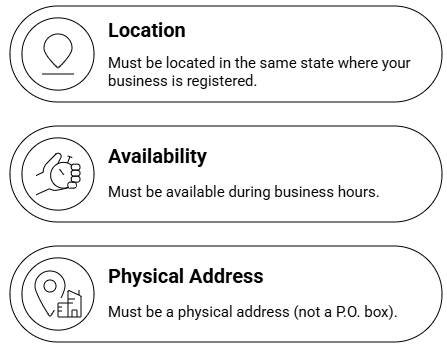Starting a business involves handling a lot of paperwork, and making the right decisions about your company’s addresses is critical for compliance and branding.
Two addresses you’ll encounter early on are the Registered Agent address and the Business address.
While they may sound similar, they serve very different purposes.
Let’s break down what each address is, why they matter, and how you can simplify both with PostScan Mail’s 💲10/month Registered Agent service. Explore Pricing & Features →
What is a Registered Agent Address?
A Registered Agent is a person or service that receives official legal documents on behalf of your business, including:

Requirements:

Stay compliant with PostScan Mail’s Registered Agent service — only $10/month.
Start Registered Agent (💲10/mo)
What is a Business Address?
Your Business Address is where you publicly conduct operations. It’s the location listed on websites, invoices, and business cards. It’s often used for:
-
Customer communication
-
Office location
-
Receiving business mail
This address doesn’t have to be the same as your registered agent’s. Many remote or home-based businesses use a virtual business address to maintain a professional presence.
Registered Agent Address vs. Business Address
Choosing the right addresses for your business isn’t just about mail—it’s about meeting legal obligations, maintaining privacy, and projecting professionalism.
While both a Registered Agent address and a Business address are essential, they serve distinct purposes.
Understanding how they differ can help you make more informed decisions when setting up or expanding your business.
Overview of Major Differences:
| Feature | Registered Agent Address | Business Address |
| Legal requirement | ✅ Yes | ❌ No |
| Publicly visible | ✅ Yes | ✅ Yes |
| Receives legal documents | ✅ Yes | ❌ No (unless same address) |
| Can be virtual | ❌ No | ✅ Yes |
| Used for operations | ❌ No | ✅ Yes |
Why You Need Both
Using a Registered Agent protects your privacy, especially if you’re working from home. Instead of listing your address on public documents, you use a third-party service to receive sensitive legal notices securely and reliably.
A Business Address helps you build credibility and separate your personal and professional life.
Bundle your mail and compliance with PostScan Mail’s address solutions.
- Virtual Business Address
- Mail Scanning & Forwarding
- Dedicated Registered Agent
See Plans →
Advantages of Using a Registered Agent Address with PostScan Mail
- It’d be great if your business stays compliant with state requirements.
- Protects your privacy by keeping your personal address off public records.
- Avoids missed legal documents with reliable, secure delivery.
- Maintains a consistent legal presence in your state of formation.
- PostScan Mail offers fast notifications, digital copies, and mail forwarding services.
- Affordable and hassle-free—just $10/month for complete peace of mind.
Pricing & Value
PostScan Mail makes it affordable to protect your business:
| Service | Price | Benefits |
| Registered Agent Service | From $10/mo | Legal compliance, privacy, and timely alerts |
| Virtual Mailbox | $10/mo | Mail scanning, forwarding, and professional address |
Protect your business and project a professional image, starting at $10/month.
Choose Your Plan →
Choosing Between a Registered Agent Address and a Virtual Address
| Feature | Registered Agent Address | Virtual Address |
| Legal Requirement | ✅ Yes (mandatory for LLCs & Corporations) | ❌ No (optional for business image) |
| Receives Legal Documents | ✅ Yes | ❌ No (only regular mail) |
| Can Be Used for LLC/Corp Formation | ✅ Yes | 🟡 Sometimes (depends on state) |
| Privacy Protection | ✅ Keeps your home address private | ✅ Also protects personal address |
| Digital Mail Access | 🟡 Limited (only legal notices) | ✅ Full mail scanning & online access |
| Business Image | 🟡 Neutral (not client-facing) | ✅ Enhances credibility & branding |
| Package Handling | ❌ No | ✅ Yes (varies by plan/location) |
| Available Through PostScan Mail | ✅ Yes – $10/month | ✅ Yes – Plans start at $10/month |
Choosing the Right Address for Your Business Needs
Deciding between a Registered Agent address and a Virtual Address depends on your business goals.
Whether you need to stay compliant with legal requirements or present a polished brand image, understanding the strengths of each option is essential.
The table above provides a quick comparison to help you choose the right fit.
Need both? PostScan Mail offers bundled solutions for just $10/month.
Get Started with Registered Agent & Virtual Address →
Legal Implications of Registered Agent Address vs. Business Address
| Legal Factor | Registered Agent Address | Business Address |
| State Requirement for Formation | ✅ Required by law for LLCs & Corporations | ❌ Not legally required |
| Public Record Exposure | ✅ Listed on state business filings | ✅ Often listed on websites, directories |
| Service of Process | ✅ Must accept legal notices & lawsuits | ❌ Not responsible for legal services |
| Non-Compliance Risk | ⚠️ Can lead to penalties or dissolution | ❌ No legal penalty for missing or omitting |
| Change Notification Required | ✅ Must notify the state if changed | ❌ Typically no formal change requirement |
| Privacy Concerns | ✅ Shield the owner’s personal address | ❌ Using a home address exposes personal info |
| Use in Multiple States | 🟡 Requires a separate agent per state | ✅ Can maintain multiple business addresses |
How to Change Your Address
Changing your address with PostScan Mail is quick and hassle-free.
Simply follow these steps:
- Log into Your PostScan Mail Account
- Go to PostScanMail.com and click “Login” at the top right.
- Access Your Account Settings
- Once logged in, navigate to your account dashboard and select “Account Settings” or “Mailing Address”.
- Select the ‘Change Address’ Option
- Select the option to update your mailing address or switch to a different location.
- Choose a New Mailbox Location
- Browse available virtual address locations nationwide.
- Select the address that fits your business or personal needs.
- Complete the USPS Form 1583 (if required)
- If switching to a new virtual mailbox, complete a new USPS Form 1583 for mail authorization.
- Update Address with Contacts
- Notify clients, vendors, and government agencies (like the IRS or your state’s Secretary of State) of your new address.
- Start Receiving Mail at Your New Address
- Once confirmed, PostScan Mail will begin scanning and forwarding mail from your new location.
Need help switching addresses? Contact our support team for quick assistance, or start browsing new locations now.
Find Your New Address →
Choosing the Right Solution for Your Business
Every business has unique needs—whether you’re launching a startup, expanding into new states, or simply working from home.
Choosing between a Registered Agent, Virtual Address, or both depends on what matters most to your operations:
- Need to stay legally compliant? A Registered Agent is required by law for LLCs and corporations. It ensures you never miss important legal documents and keeps your business in good standing.
- Want a professional business presence? A virtual address provides a real street address for receiving mail, enhances credibility, and maintains privacy.
- Looking for convenience and coverage? Combine both services through PostScan Mail for just $10/month—protect your business, manage mail digitally, and maintain a polished public image.
No matter your stage or setup, PostScan Mail has the solution to support your growth.
Explore Plans and Pricing →
Final Thoughts
While your Registered Agent and Business Address serve different roles, both are essential to running a compliant and credible company. PostScan Mail helps you handle both with ease.
Ready to simplify compliance and enhance your image?
Get started with our Registered Agent service — just $10/month.
Start Registered Agent (💲10/mo)
▼ You Might Also Like ▼
- Find a Registered Agent for Your Business: Easy Guide!
- Virtual PO Box: A Next-Gen Solution for Mail Management
- Forwarding Mail to a Temporary Address
- Boost Mail Management with Premium Mail Forwarding Service


